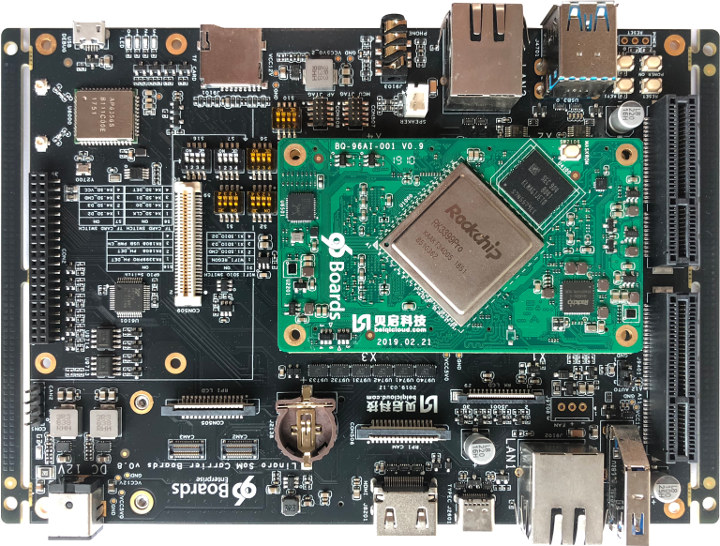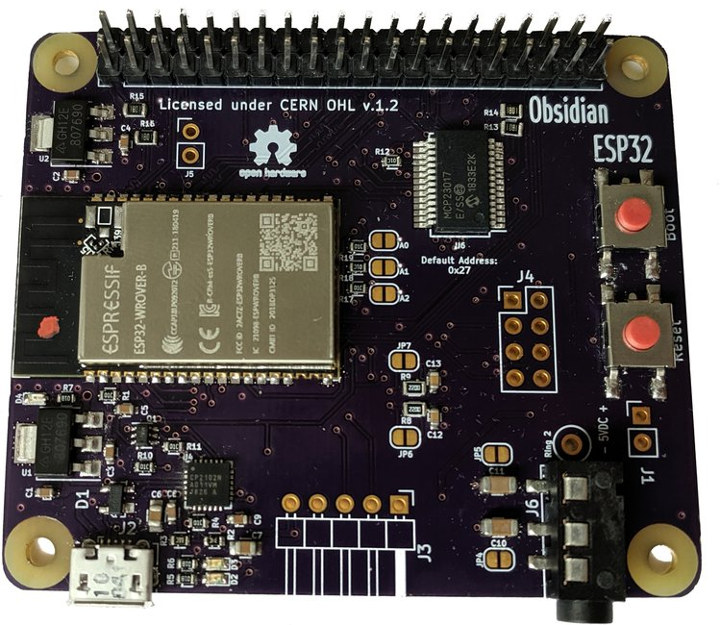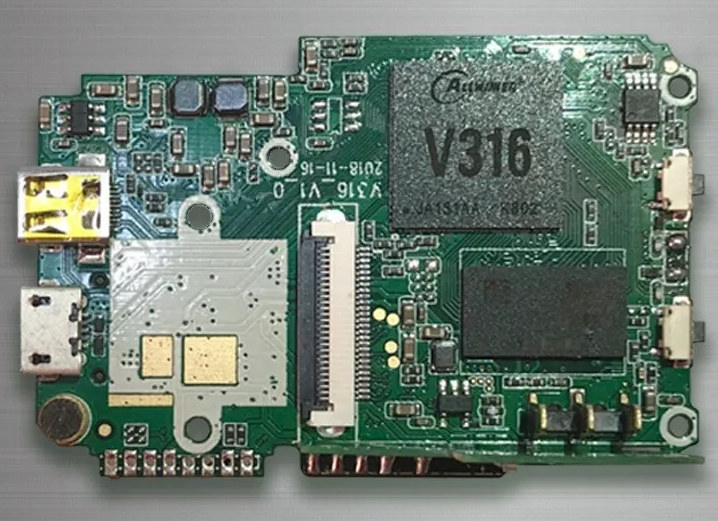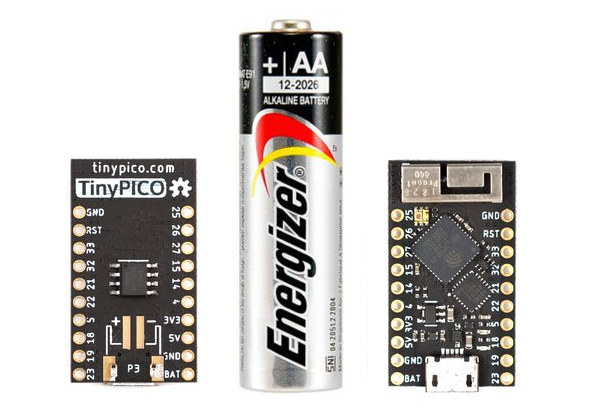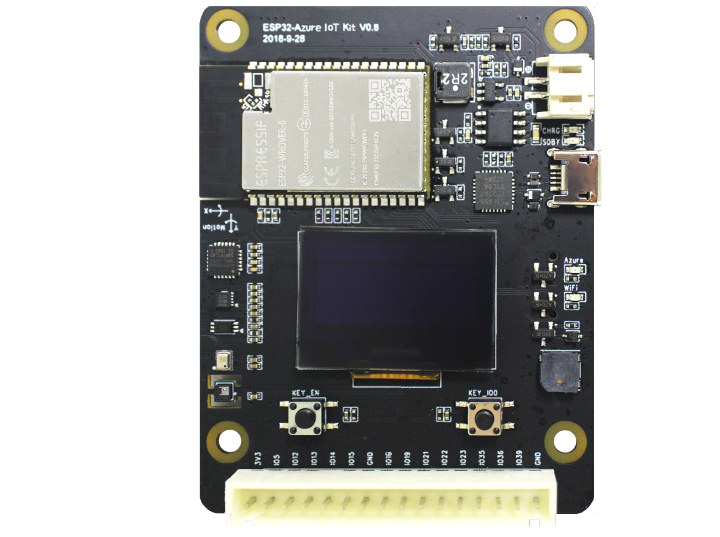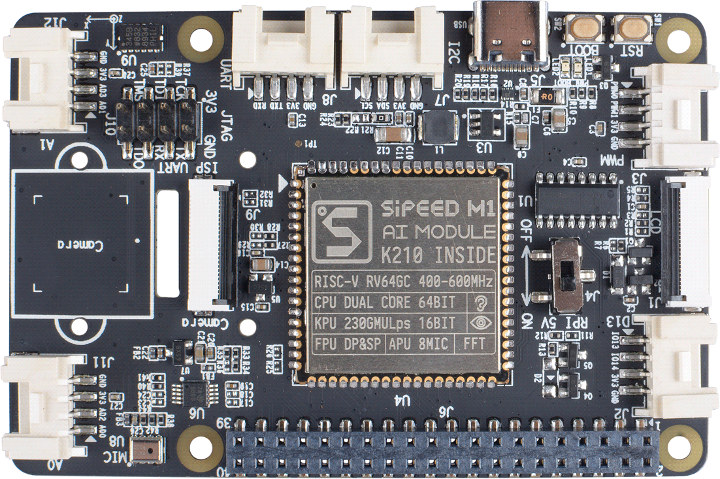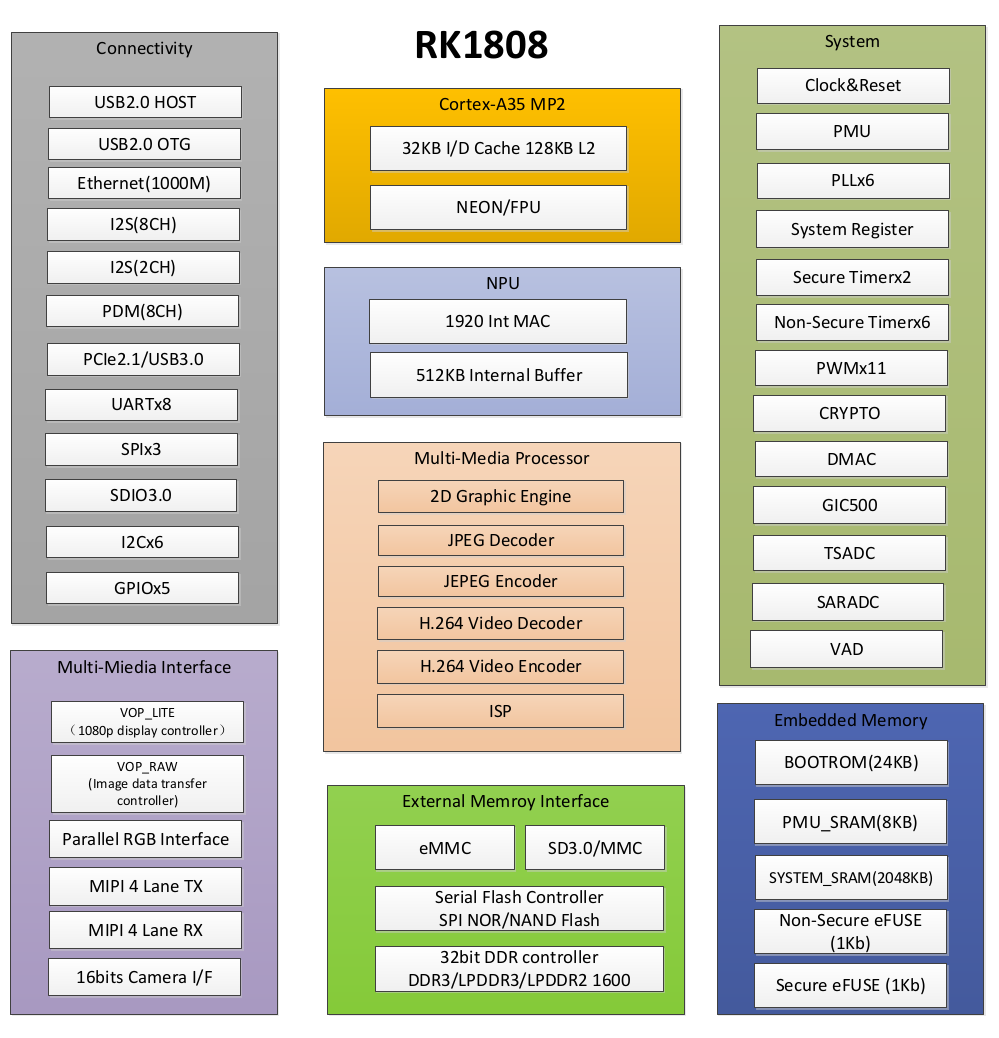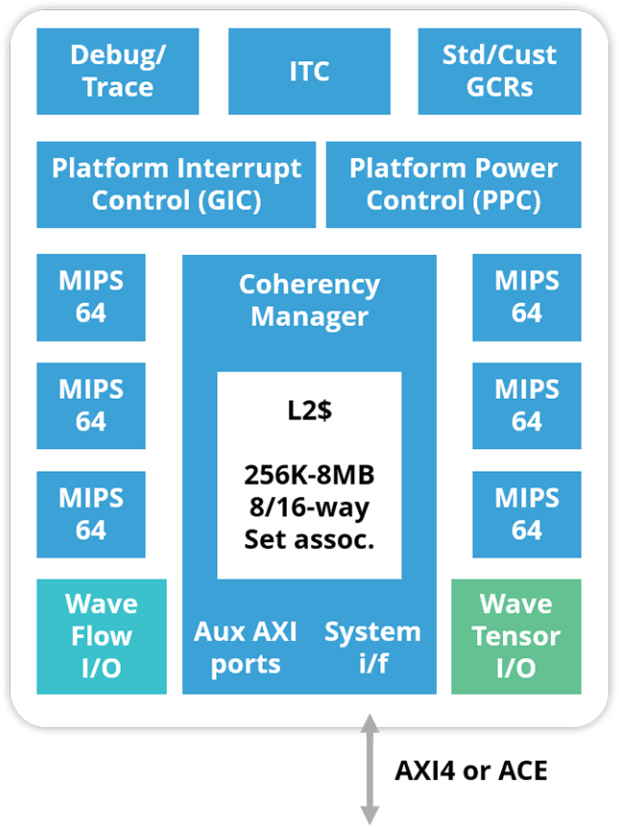Back in April, we covered the very first 96Boards SoM’s (Systems-on-Module) which were based on Rockchip RK3399Pro or RK1808 processors, and targeted applications leveraging artificial intelligence acceleration. There were not quite available at the time, but Seeed Studio now has both BeiQi modules for pre-order for $119 and $59 respectively, while the carrier board goes with $125 with antennas, and power supply. Note that the RK3399Pro SoM and the carrier board are basically available now with shipping schedule for July 4th, but you’d had to wait until the end of the month for the RK1808 module. BeiQi RK1808 AIoT 96Boards Compute SoM Module specifications: SoC – Rockchip RK1808 dual-core Arm Cortex-A35 processor @ 1.6 GHz with NPU supporting 8-bit/16-bit operations up to 3.0 TOPS, TensorFlow and Caffe frameworks; 22nm FD-SOI process System Memory – 1GB LPDDR3 (I also read “4GB LPDRR3” (sic.) in other places, but the capacity is likely […]
Obsidian ESP32 Board Follows Raspberry Pi Model A Form Factor (Crowdfunding)
When Thomas McKahan had been playing with ESP32 for a while, he found the need to use Raspberry Pi HAT boards and enclosure with his new hardware, so he went ahead and designed his own ESP32 board compatible with Raspberry Pi accessories, and following the smaller Raspberry Pi Model A / 3 Model A+ form factor. Obsidian ESP32 specifications: Wireless module – Espressif Systems ESP32-WROVER-B 802.11 b/g/n WiFi + Bluetooth 4.2 / BLE module with 16 MB flash, 8 MB PSRAM USB – 1x micro USB port for power and programming Audio – 3.5mm TRS audio jack connected to ESP32 DACs Expansion 40-pin GPIO header compatible with popular HAT expansion boards with 3.3 V signalling, I²S for audio DAC, I²C and SPI, Serial UART available on header or via microUSB, I²C GPIO expander with interrupts & address selection 8-pim unpopulated header from remaining I/Os accessible through GPIO expander 5-pin unpopulated […]
Allwinner V316 Processor is made for Low-Cost “True” 4K 30 FPS Cameras
Allwinner V-Series processors target camera applications, especially sports and action cameras, and we’ve already coverd Allwinner V3 single core Arm Cortex-A7 processor for 1080p60 / 4K15 cameras, as well as Allwinner V5 quad core Cortex-A7 processor for 4K30 cameras enhanced with artificial intelligence capabilities. Allwinner has showcased and/or unveiled more Cortex-A7 processors at CES Asia 2019 such as Allwinner R328 for voice applications, or Allwinner T7 for automotive dashboards, as well as a new camera processor called Allwinner V316 with two Arm Cortex-A7 cores, apparently the same 4K @ 30 fps H.265/H.264 encoder as in V5, but without AI engine architecture. Allwinner V316 key features and preliminary specifications: CPU – Dual core Arm Cortex-A7 processor @ 1.2 GHz ISP – HawkView 6.0 image processor with 2D/3D intelligent noise reduction, frame width dynamic synthesis, sharpening enhancement, specific color enhancement and other image pre-processing techniques Video – 4K Smart H.264/H.265 video encoder […]
Low Power TinyPICO ESP32 Board Ships with Micropython (Crowdfunding)
There are so many ESP32 boards available now, so why bother with another ones. Some of the key selling points of TinyPICO are that it is really small at 32 x 18 mm, it’s easy to use out of the box with MicroPython firmware pre-loaded, and supports LiPo batteries with an optimized power path for low-power battery usage. The developer, named Unexpected Maker, also provides various shields for TinyPICO adding a display, sensors, an audio amplifier, an RTC, Grove headers, and more. TinyPICO board specifications: System-in-Package – Espressif Systems ESP32-PICO-D4 SiP with ESP32 dual-core processor operating at 240 MHz, 4 MB SPI flash External System Memory – 4 MB PSRAM Connectivity – 2.4 GHz WiFi 4 802.11b/g/n, Bluetooth 4.2 LE, 3D antenna Expansion – 14x GPIO broken out to standard pitch headers Debugging / Programming – USB + serial/UART for programming Misc – Power (red) & charge (orange) LED’s, APA102 […]
Espressif Rolls out ESP32 Boards for Microsoft Azure IoT & Google Cloud IoT Core Services
Espressif ESP32 WiFi & Bluetooth processor is pretty versatile, and you could connect any ESP32 board to any cloud services with some efforts. But to make things even easier Espressif Systems worked with Microsoft and Google to release versions of ESP32 boards specifically designed to connect to Microsoft Azure IoT or Google Cloud IoT core. Meet ESP32-Azure IoT Kit and ESP32-DevKitC Google Cloud IoT. ESP32-Azure IoT Kit Hardware specifications: Wireless Module – ESP32-WROVER-B WiFi and Bluetooth module Storage – MicroSD card socket Display – 0.96” blue and yellow OLED display driven by SSD1306 I2C driver chip Sensors InvenSense MPU6050 motion sensor NXP MAG3110 magnetometer FBM320 barometer STMicro HTS221 humidity & temperature sensor ROHM BH1750FVI light sensor Expansion – 16-pin header Debugging – USB to UART bridge for serial debugging & programming Misc – Reset button, user button, 2x charge LED’s, 2x user LED’s, 1x passive buzzer Power Supply – 5V […]
Grove AI HAT Helps Raspberry Pi Run Edge Computing Workloads
Last year we wrote about Kendryte K210 dual core RISC-V processor specifically designed for for machine vision and machine hearing as well as the corresponding Kendryte KD233 which enables inference at the edge, e.g. tasks such as face recognition or object detection. Latter on we found the processor in Sipeed M1 module which went for as low as $5 in a crowdfunding campaign, and was fitted to some low cost boards now selling for $12.90 on Seeed Studio. The latter company has now designed Grove AI HAT that aims to assist Raspberry Pi in running the edge computing workloads previously described, as exposes 6 Grove interfaces to extend functionality with some of the Grove add-on modules. Grove AI HAT specifications: AI Module – Sipeed “MAIX” M1 with Kendryte K210 dual core RISC-V processor @ 600 MHz, KPU Convolutional Neural Network (CNN) hardware accelerator, APU audio hardware accelerator, 8 MB general […]
Rockchip RK1808 Datasheet, TRM, Schematics and Linux SDK Released
Rockchip RK1808 is the first chip from the company fully dedicated to artificial intelligence applications. The Neural Processing Unit (NPU) features an accelerator delivering up to 3.0 TOPS and is coupled with two low power Arm Cortex-A35 cores allowing it to run Linux. We’ve had the specifications for RK1808 for a while, but the company has recently posted hardware and software resources on their open source website. On the hardware side we’ve got: RK1808 Technical Reference Manual (TRM) RK1808 datasheet PDF Schematics for the company’s official RK1808-EVB On the software side we can get the Linux SDK from Github as explained in the Wiki:
|
1 2 3 4 5 |
git clone https://github.com/rockchip-linux/repo mkdir linux cd linux ../repo/repo init --repo-url=https://github.com/rockchip-linux/repo -u https://github.com/rockchip-linux/manifests -b master -m rk1808_linux_release.xml ../repo/repo sync |
Finally configure the build and start the build process:
|
1 2 3 |
sudo apt install liblz4-tool build-essential source envsetup.sh rockchip_rk1808 ./build.sh |
After a while, or more accurately close to two hours on a Laptop with Ryzen 7 2700U processor, 8GB RAM, and hard drive, we’ll get U-boot, Linux, buildroot based rootfs, and firmware files and in […]
MIPS Based TritonAI 64 AI IP Platform to Enable Inferencing & Training at the Edge
After announcing their first MIPS Open release a few weeks ago, Wave Computing is back in the news with the announcement of TritonAI 64, an artificial intelligence IP platform combining MIPS 64-bit + SIMD open instruction set architecture with the company’s WaveTensor subsystem for the execution of convolutional neural network (CNN) algorithms, and WaveFlow flexible, scalable fabric for more complex AI algorithms. TritonAI 64 can scale up to 8 TOPS/Watt, over 10 TOPS/mm2 using a standard 7nm process node, and eventually would allow both inference and training at the edge. The platform supports 1 to 6 cores with MIPS64r6 ISA boasting the following features: 128-bit SIMD/FPU 8/16/32/int, 32/64 FP datatype support Virtualization extensions Superscalar 9-stage pipeline w/SMT Caches (32KB-64KB), DSPRAM (0-64KB) Advanced branch predict and MMU Integrated L2 cache (0-8MB, opt ECC) Power management (F/V gating, per CPU) Interrupt control with virtualization 256b native AXI4 or ACE interface Here’s the […]


